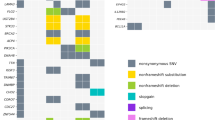Abstract
Inflammatory breast cancer (IBC) is a unique clinical entity characterized by rapid onset of erythema and swelling of the breast often without an obvious breast mass. Many studies have examined and compared gene expression between IBC and non-IBC (nIBC), repeatedly finding clusters associated with receptor subtype, but no consistent gene signature associated with IBC has been validated. Here we compared microdissected IBC tumor cells to microdissected nIBC tumor cells matched based on estrogen and HER-2/neu receptor status. Gene expression analysis and comparative genomic hybridization were performed. An IBC gene set and genomic set were identified using a training set and validated on the remaining data. The IBC gene set was further tested using data from IBC consortium samples and publicly available data. Receptor driven clusters were identified in IBC; however, no IBC-specific gene signature was identified. Fifteen genes were correlated between increased genomic copy number and gene overexpression data. An expression-guided gene set upregulated in the IBC training set clustered the validation set into two clusters independent of receptor subtype but segregated only 75 % of samples in each group into IBC or nIBC. In a larger consortium cohort and in published data, the gene set failed to optimally enrich for IBC samples. However, this gene set had a high negative predictive value for excluding the diagnosis of IBC in publicly available data (100 %). An IBC enriched genomic data set accurately identified 10/16 cases in the validation data set. Even with microdissection, no IBC-specific gene signature distinguishes IBC from nIBC. Using microdissected data, a validated gene set was identified that is associated with IBC tumor cells. Inflammatory breast cancer comparative genomic hybridization data are presented, but a validated genomic data set that identifies IBC is not demonstrated.










Similar content being viewed by others
References
Bertucci F, Finetti P, Rougemont J, Charafe-Jauffret E, Cervera N, Tarpin C et al (2005) Gene expression profiling identifies molecular subtypes of inflammatory breast cancer. Cancer Res 65:2170–2178
Bertucci F, Finetti P, Rougemont J, Charafe-Jauffret E, Nasser V, Loriod B et al (2004) Gene expression profiling for molecular characterization of inflammatory breast cancer and prediction of response to chemotherapy. Cancer Res 64:8558–8565
Bieche I, Lerebours F, Tozlu S, Espie M, Marty M, Lidereau R (2004) Molecular profiling of inflammatory breast cancer: identification of a poor-prognosis gene expression signature. Clin Cancer Res 10:6789–6795
Dressman HK, Hans C, Bild A, Olson JA, Rosen E, Marcom PK et al (2006) Gene expression profiles of multiple breast cancer phenotypes and response to neoadjuvant chemotherapy. Clin Cancer Res 12:819–826
Iwamoto T, Bianchini G, Qi Y, Cristofanilli M, Lucci A, Woodward WA et al (2011) Different gene expressions are associated with the different molecular subtypes of inflammatory breast cancer. Breast Cancer Res Treat 125:785–795
Nguyen DM, Sam K, Tsimelzon A, Li X, Wong H, Mohsin S et al (2006) Molecular heterogeneity of inflammatory breast cancer: a hyperproliferative phenotype. Clin Cancer Res 12:5047–5054
Van Laere S, Van der Auwera I, Van den Eynden G, Van Hummelen P, van Dam P, Van Marck E et al (2007) Distinct molecular phenotype of inflammatory breast cancer compared to non-inflammatory breast cancer using Affymetrix-based genome-wide gene-expression analysis. Br J Cancer 97:1165–1174
Van Laere S, Van der Auwera I, Van den Eynden GG, Fox SB, Bianchi F, Harris AL et al (2005) Distinct molecular signature of inflammatory breast cancer by cDNA microarray analysis. Breast Cancer Res Treat 93:237–246
Van Laere SJ, Van den Eynden GG, Van der Auwera I, Vandenberghe M, van Dam P, Van Marck EA et al (2006) Identification of cell-of-origin breast tumor subtypes in inflammatory breast cancer by gene expression profiling. Breast Cancer Res Treat 95:243–255
Van Laere SJ, Van der Auwera I, Van den Eynden GG, Elst HJ, Weyler J, Harris AL et al (2006) Nuclear factor-kappaB signature of inflammatory breast cancer by cDNA microarray validated by quantitative real-time reverse transcription-PCR, immunohistochemistry, and nuclear factor-kappaB DNA-binding. Clin Cancer Res 12:3249–3256
Boersma BJ, Reimers M, Yi M, Ludwig JA, Luke BT, Stephens RM et al (2008) A stromal gene signature associated with inflammatory breast cancer. Int J Cancer 122:1324–1332
Dawood S, Merajver SD, Viens P, Vermeulen PB, Swain SM, Buchholz TA et al (2011) International expert panel on inflammatory breast cancer: consensus statement for standardized diagnosis and treatment. Ann oncol 22:515–523
Sircoulomb F, Bekhouche I, Finetti P, Adelaide J, Ben Hamida A, Bonansea J et al (2010) Genome profiling of ERBB2-amplified breast cancers. BMC Cancer 10:539
Van der Auwera I, Bovie C, Svensson C, Limame R, Trinh XB, van Dam P et al (2009) Quantitative assessment of DNA hypermethylation in the inflammatory and non-inflammatory breast cancer phenotypes. Cancer Biol Ther 8:2252–2259
Acknowledgments
The authors appreciate the patients who provided samples for these studies and the Morgan Welch Inflammatory Breast Cancer Clinic and Research Program for support. The National Institute of Health R01CA138239-01; The State of Texas Grant for Rare and Aggressive Cancers.
Ethical standard
All experiments herein comply with all federal laws in the US and Japan governing the use of human tissues and protection of human subjects.
Conflict of interest
The authors have no conflicts of interest to disclose.
Author information
Authors and Affiliations
Corresponding author
Electronic supplementary material
Below is the link to the electronic supplementary material.
Rights and permissions
About this article
Cite this article
Woodward, W.A., Krishnamurthy, S., Yamauchi, H. et al. Genomic and expression analysis of microdissected inflammatory breast cancer. Breast Cancer Res Treat 138, 761–772 (2013). https://doi.org/10.1007/s10549-013-2501-6
Received:
Accepted:
Published:
Issue Date:
DOI: https://doi.org/10.1007/s10549-013-2501-6




